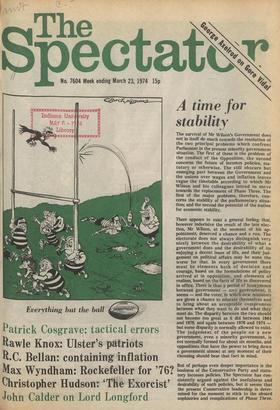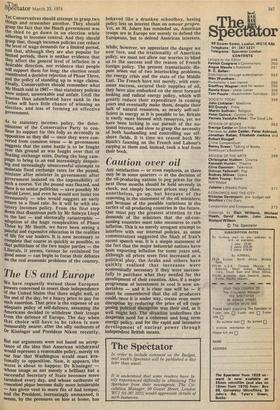A time for
stability The survival of Mr Wilson's Government does not in itself do much towards the resolution of the two principal problems which confront Parliament in the present minority government situation. The first of these is the problem of the conduct of the Opposition, the second concerns the future of incomes policies, statutory or otherwise. The still obscure but emerging pact between the Government and the unions over wages and inflation leaves vague the timetable according to which Mr Wilson and his colleagues intend to move towards the replacement of Phase Three. The first of the major problems, therefore, concerns the stability of the parliamentary situation; and the second the potential of the nation for economic stability.
There appears to exist a general feeling that, however indecisive the result of the late election, Mr Wilson, at the moment of his appointment, deserved a chance and a run. The electorate does not always distinguish very nicely between the desirability of what a government does and the desirability of its enjoying a decent lease of life, and their judgement on political affairs may be none the worse for that. In every government there must be elements both of decision and courage, based on the formulations of policy arrived at in opposition, and elements of realism, based on the facts of life as discovered in office. There is thus a period of honeymoon between government — any government, it seems — and the voter, in which new ministers are given a chance to educate themselves and to bring about an acceptable compromise between what they want to do and what they must do. The disparity between the two should not become too great as it did between 1964 and 1970, and again between 1970 and 1974 — but some disparity is normally allowed to exist. The judgement of the people on a new government, even a minority government, is not normally formed for about six months, and oppositions that have the power to bring down a government almost at any moment of their choosing should bear that fact in mind.
But of perhaps even deeper importance is the business of the Conservative Party and statutory incomes policies. The Spectator has consistently argued against the usefulness and desirability of such policies, but it seems that the present Conservative leadership is determined for the moment to stick to the absurd sophistries and complications of Phase Three. Yet Conservatives should attempt to grasp two things and remember another. They should grasp the fact that the Heath government was the third to go down in an election while adhering to incomes control. And they should gt'asp that, though incomes policies can reduce the level of wage demands for a limited period, and that, although they are also popular for limited periods, there is neither evidence that they affect the general level of inflation in a desirable direction, nor evidence that people Will support them for long: the election result constituted a decisive rejection of Phase Three, and the policy of standing up to wage claims. Finally, Conservatives should remember what Mr Heath said in 1967— that statutory policies were unjust, unworkable and unfair. Until the lessons thus adumbrated have sunk in the Tories will have little chance of winning an election, and less of forming an effective government.
As to statutory incomes policy, the deternynation of the Conservative Party to continue its support for this folly as devotedly in oPposition as they did — once they were converted from common sense — in government suggests that the same battle is to be fought over this ground as was fought over that of floating exchange rates. During the long campaign to bring to an end increasingly despairing and increasingly unsuccessful attempts to maintain fixed exchange rates for the pound, minister after minister in government after government insisted on the impossibility of such a course. Yet the pound was floated, and there is no senior politician — save possibly Mr Harold Lever, and even he would not insist too strenuously — who would suggest an early return to a fixed rate. So it will be with statutory incomes policy. From the first step down that disastrous path by Mr Selwyn Lloyd to the last — and electorally catastrophic adoption of the huge complexities of Phase Three by Mr Heath, we have been seeing a Painful and expensive education in the realities of life for our leaders. It is now necessary to complete that course as quickly as possible, so that politicians of the two major parties — the Liberals, it seems, cannot be reclaimed for good sense — can begin to focus their debates on the real economic problems of the country.



































